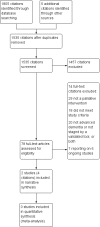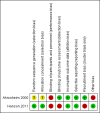Palliative care interventions in advanced dementia
- PMID: 27911489
- PMCID: PMC6463843
- DOI: 10.1002/14651858.CD011513.pub2
Palliative care interventions in advanced dementia
Update in
-
Palliative care interventions in advanced dementia.Cochrane Database Syst Rev. 2021 Sep 28;9(9):CD011513. doi: 10.1002/14651858.CD011513.pub3. Cochrane Database Syst Rev. 2021. PMID: 34582034 Free PMC article.
Abstract
Background: Dementia is a chronic, progressive and ultimately fatal neurodegenerative disease. Advanced dementia is characterised by profound cognitive impairment, inability to communicate verbally and complete functional dependence. Usual care of people with advanced dementia is not underpinned universally by a palliative approach. Palliative care has focused traditionally on care of people with cancer but for more than a decade, there have been increased calls worldwide to extend palliative care services to include all people with life-limiting illnesses in need of specialist care, including people with dementia.
Objectives: To assess the effect of palliative care interventions in advanced dementia and to report on the range of outcome measures used.
Search methods: We searched ALOIS, the Cochrane Dementia and Cognitive Improvement Group's Specialized Register on 4 February 2016. ALOIS contains records of clinical trials identified from monthly searches of several major healthcare databases, trial registries and grey literature sources. We ran additional searches across MEDLINE (OvidSP), Embase (OvidSP), PsycINFO (OvidSP), CINAHL (EBSCOhost), LILACS (BIREME), Web of Science Core Collection (ISI Web of Science), ClinicalTrials.gov and the World Health Organization ICTRP trial portal to ensure that the searches were as comprehensive and as up-to-date as possible.
Selection criteria: We searched for randomised (RCT) and non-randomised controlled trials (nRCT), controlled before-and-after studies (CBA) and interrupted time series studies evaluating the impact of palliative care interventions for adults with dementia of any type, staged as advanced dementia by a recognised and validated tool. Participants could be people with advanced dementia, their family members, clinicians or paid care staff. We included clinical interventions and non-clinical interventions. Comparators were usual care or another palliative care intervention. We did not exclude studies on the basis of outcomes measured and recorded all outcomes measured in included studies.
Data collection and analysis: Two review authors independently assessed for inclusion all the potential studies we identified as a result of the search strategy. We resolved any disagreement through discussion or, when required, consulted with the rest of the review team. We independently extracted data and conducted assessment of methodological quality, using standard Cochrane methods.
Main results: We identified two studies of palliative care interventions for people with advanced dementia. We did not pool data due to the heterogeneity between the two trials in terms of the interventions and the settings. The two studies measured 31 different outcomes, yet they did not measure the same outcome. There are six ongoing studies that we expect to include in future versions of this review.Both studies were at high risk of bias, in part because blinding was not possible. This and small sample sizes meant that the overall certainty of all the evidence was very low.One individually randomised RCT (99 participants) evaluated the effect of a palliative care team for people with advanced dementia hospitalised for an acute illness. While this trial reported that a palliative care plan was more likely to be developed for participants in the intervention group (risk ratio (RR) 5.84, 95% confidence interval (CI) 1.37 to 25.02), the plan was only adopted for two participants, both in the intervention group, while in hospital. The palliative care plan was more likely to be available on discharge in the intervention group (RR 4.50, 95% CI 1.03 to 19.75). We found no evidence that the intervention affected mortality in hospital (RR 1.06, 95% CI 0.53 to 2.13), decisions to forgo cardiopulmonary resuscitation in hospital or the clinical care provided during hospital admission, but for the latter, event rates were low and the results were associated with a lot of uncertainty.One cluster RCT (256 participants, each enrolled with a family carer) evaluated the effect of a decision aid on end-of-life feeding options on surrogate decision-makers of nursing home residents with advanced dementia. Data for 90 participants (35% of the original study) met the definition of advanced dementia for this review and were re-analysed for the purposes of the review. In this subset, intervention surrogates had lower scores for decisional conflict measured on the Decisional Conflict Scale (mean difference -0.30, 95% CI -0.61 to 0.01, reduction of 0.3 to 0.4 units considered meaningful) and were more likely than participants in the control group to discuss feeding options with a clinician (RR 1.57, 95% CI 0.93 to 2.64), but imprecision meant that there was significant uncertainty about both results.
Authors' conclusions: Very little high quality work has been completed exploring palliative care interventions in advanced dementia. There were only two included studies in this review, with variation in the interventions and in the settings that made it impossible to conduct a meta-analysis of data for any outcome. Thus, we conclude that there is insufficient evidence to assess the effect of palliative care interventions in advanced dementia. The fact that there are six ongoing studies at the time of this review indicates an increased interest in this area by researchers, which is welcome and needed.
Conflict of interest statement
We have no known conflicts of interest to declare.
Figures









Similar articles
-
Palliative care interventions in advanced dementia.Cochrane Database Syst Rev. 2021 Sep 28;9(9):CD011513. doi: 10.1002/14651858.CD011513.pub3. Cochrane Database Syst Rev. 2021. PMID: 34582034 Free PMC article.
-
Non-pharmacological interventions for preventing delirium in hospitalised non-ICU patients.Cochrane Database Syst Rev. 2021 Jul 19;7(7):CD013307. doi: 10.1002/14651858.CD013307.pub2. Cochrane Database Syst Rev. 2021. PMID: 34280303 Free PMC article.
-
Algorithm-based pain management for people with dementia in nursing homes.Cochrane Database Syst Rev. 2022 Apr 1;4(4):CD013339. doi: 10.1002/14651858.CD013339.pub2. Cochrane Database Syst Rev. 2022. PMID: 35363380 Free PMC article.
-
Personally tailored activities for improving psychosocial outcomes for people with dementia in long-term care.Cochrane Database Syst Rev. 2018 Feb 13;2(2):CD009812. doi: 10.1002/14651858.CD009812.pub2. Cochrane Database Syst Rev. 2018. Update in: Cochrane Database Syst Rev. 2023 Mar 13;3:CD009812. doi: 10.1002/14651858.CD009812.pub3. PMID: 29438597 Free PMC article. Updated.
-
Non-pharmacological interventions for preventing delirium in hospitalised non-ICU patients.Cochrane Database Syst Rev. 2021 Nov 26;11(11):CD013307. doi: 10.1002/14651858.CD013307.pub3. Cochrane Database Syst Rev. 2021. PMID: 34826144 Free PMC article.
Cited by
-
Navigating late-stage dementia: A perspective from the Alzheimer's Association.Alzheimers Dement (Amst). 2024 Mar 15;16(1):e12530. doi: 10.1002/dad2.12530. eCollection 2024 Jan-Mar. Alzheimers Dement (Amst). 2024. PMID: 38496717 Free PMC article.
-
Key Considerations When Providing Physical Rehabilitation for People with Advanced Dementia.Int J Environ Res Public Health. 2023 Feb 26;20(5):4197. doi: 10.3390/ijerph20054197. Int J Environ Res Public Health. 2023. PMID: 36901207 Free PMC article.
-
Before Hospice: Symptom Burden, Dementia, and Social Participation in the Last Year of Life.J Palliat Med. 2019 Sep;22(9):1106-1114. doi: 10.1089/jpm.2018.0479. Epub 2019 May 6. J Palliat Med. 2019. PMID: 31058566 Free PMC article.
-
Living and dying with advanced dementia: A prospective cohort study of symptoms, service use and care at the end of life.Palliat Med. 2018 Mar;32(3):668-681. doi: 10.1177/0269216317726443. Epub 2017 Sep 18. Palliat Med. 2018. PMID: 28922625 Free PMC article.
-
Palliative Care Intervention Trials for Adults Living With Progressive Central Nervous System Diseases and Their Caregivers: A Systematic Review.J Pain Symptom Manage. 2022 Jan;63(1):e88-e110. doi: 10.1016/j.jpainsymman.2021.06.010. Epub 2021 Jun 18. J Pain Symptom Manage. 2022. PMID: 34147576 Free PMC article.
References
References to studies included in this review
-
- Ahronheim JC, Morrison RS, Morris J, Baskin S, Meier DE. Palliative care in advanced dementia: a randomized controlled trial and descriptive analysis. Journal of Palliative Medicine 2000;3(3):265‐73. [] - PubMed
- Baskin SA, Morris J, Ahronheim JC, Meier DE, Morrison RS. Barriers to obtaining consent in dementia research: implications for surrogate decision‐making. Journal of American Geriatric Society 1998;46(3):287‐90. [] - PubMed
-
4479310
-
- Hanson LC, Carey TS, Caprio AJ, Lee TJ, Ersek M, Garrett J, et al. Improving decision making for feeding options in advanced dementia: a randomized, controlled trial. Journal of the American Geriatric Society 2011;59(11):2009‐16. [] - PMC - PubMed
- Hanson LC, Gilliam R, Lee TJ. Successful clinical trial research in nursing homes: the improving decision‐making study. Clinical Trials 2010;7(6):735‐43. [] - PMC - PubMed
-
4479313
References to studies excluded from this review
-
- Bergh S, Selbaek G, Engedal K. Discontinuation of antidepressants in people with dementia and neuropsychiatric symptoms (DESEP study): double blind, randomised, parallel group, placebo controlled trial. BMJ 2012;344:e1566. [] - PubMed
-
4479316
-
- Burns A, Bernabei R, Bullock R, Cruz Jentoft AJ, Frölich L, Hock C, et al. Safety and efficacy of galantamine (Reminyl) in severe Alzheimer's disease (the SERAD study): a randomised, placebo‐controlled, double‐blind trial. Lancet Neurology 2009;8(1):39‐47. [] - PubMed
-
4479320
-
- Deyn PP, Martın‐Carrasco M, Deberdt W, Jeandel C, Hay DP, Feldman PD. Olanzapine versus placebo in the treatment of psychosis with or without associated behavioral disturbances in patients with Alzheimer's disease. International Journal of Geriatric Psychiatry 2004;19:115‐26. [] - PubMed
-
4479322
References to ongoing studies
-
- Agar M, Beattie E, Luckett T, Phillips J, Luscombe G, Goodall S, et al. Pragmatic cluster randomised controlled trial of facilitated family case conferencing compared with usual care for improving end of life care and outcomes in nursing home residents with advanced dementia and their families: the IDEAL study protocol. BioMed Central Palliative Care 2015;14:63. [] - PMC - PubMed
-
4479354
-
- Arcand M, Verreault R, Mission L. A successful intervention to improve quality of end‐of‐life care (QOC) and quality of dying (QOD) for patients with advanced dementia. European Association for Palliative Care World Conference Abstracts; 2015 May 8‐10; Copenhagen, Denmark. 2015. []
-
4479356
-
- NCT01774799. Educational video to improve nursing home care in end‐stage dementia (EVINCE). www.clinicaltrials.gov/ct/show/NCT01774799 Date first received: 21 January 2013. []
-
4479362
Additional references
-
- Allan K, Killick J. Communication and relationships: an inclusive social world. In: Downs M, Bowers B editor(s). Excellence in Dementia Care: Research into Practice. 2nd Edition. McGraw Hill Education, Open University Press, 2014:240‐56.
-
- Alzheimer's Association. 2014 Alzheimer's disease facts and figures. Alzheimer's & Dementia 2014;10(2):e47‐92. - PubMed
-
- Australian Government Department of Health and Ageing. Guidelines for a palliative approach in residential aged care. Enhanced version ‐ May 2006. www.nhmrc.gov.au/_files_nhmrc/publications/attachments/pc29.pdf (accessed 14 March 2014).
-
- Bausewein C, Daveson B, Benalia H, Simon ST, Higginson IJ. Outcome measurement in palliative care: the essentials. 2011. www.eapcnet.eu/LinkClick.aspx?fileticket=‐T62WTgTHtU%3d&tabid=1577 (accessed 13 August 2014).
Publication types
MeSH terms
Grants and funding
LinkOut - more resources
Full Text Sources
Other Literature Sources
Medical
Miscellaneous

